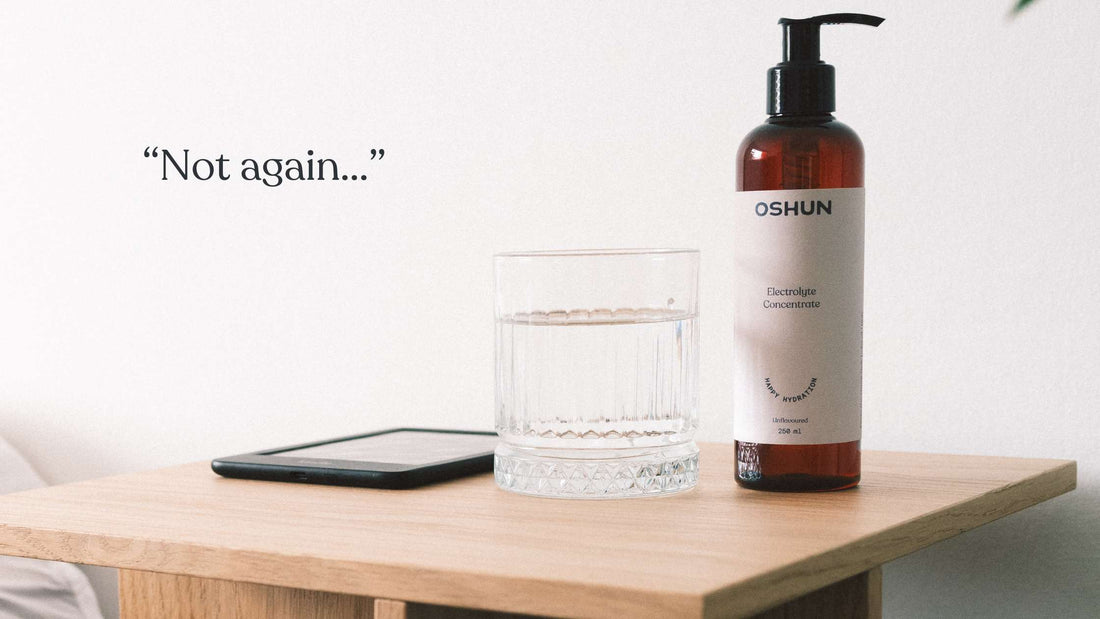
Loo trips at night? Electrolytes might help
Share
Waking up in the middle of the night with an urgent need to urinate is the worst. It's known as nocturia and can disrupt sleep, leaving you feeling groggy the next day. We've all been there. While various factors like age, bladder health, or fluid intake before bed can contribute to this issue, an often-overlooked issue might be an imbalance in electrolytes.
These essential minerals play a critical role in regulating fluid balance in the body. By maintaining proper electrolyte levels, you might reduce nighttime bathroom trips. Here’s how.
Understanding Electrolytes and Fluid Balance
Electrolytes are charged minerals that help control the movement of water in and out of cells, tissues, and organs. Sodium and potassium, in particular, act as gatekeepers for fluid retention and excretion, working in tandem with hormones like antidiuretic hormone (ADH) to regulate urine production.
When electrolyte levels are off — due to excessive sweating, poor diet, or over-hydration — your body may struggle to maintain this balance, leading to increased urine output, even at night.
For example, low sodium levels (hyponatremia) can signal the kidneys to flush out excess water, while insufficient potassium might impair the kidneys’ ability to concentrate urine. Both scenarios can increase bladder activity when you’re trying to rest. By ensuring adequate electrolyte intake, you may help your body hold onto water more effectively, reducing the volume of urine produced overnight.
The Connection Between Dehydration and Nocturia
Ironically, dehydration can also contribute to frequent nighttime urination. When you’re dehydrated, your body produces less ADH, a hormone that tells the kidneys to reabsorb water and produce less urine. Without enough fluids or electrolytes to support this process, your kidneys may overcompensate by releasing water at inopportune times — like when you’re asleep.
Drinking plain water without replenishing electrolytes can exacerbate this, diluting sodium levels and triggering more urination.
Taking electrolytes during the day, especially in the afternoon or early evening, could help maintain hydration without overloading your system with water alone. This balance might allow your kidneys to function more efficiently, cutting down on unnecessary trips to the bathroom.
Timing and Type of Electrolytes Matter
Not all electrolyte intake is created equal. Downing a sports drink loaded with sugar right before bed could backfire, as excess glucose might pull water into your bladder and create blood sugar spikes at night.
Instead, consider using Oshun electrolytes to your advantage. Oshun does not contain any sugar or additives and will help improve your sleep on multiple levels. The ionic magnesium it contains, for instance, supports muscle relaxation (including the bladder) and could promote better sleep, while the high levels of potassium help regulate fluid retention.
Timing is key: consuming electrolytes too late might increase blood volume temporarily, prompting urine production. Aim to hydrate and replenish electrolytes steadily throughout the day, tapering off fluids a few hours before bed to give your body time to adjust.
Other Benefits and Considerations
Beyond reducing nocturia, electrolytes support muscle function, nerve signalling, and energy levels — potentially improving overall sleep quality.
While nocturia has many causes, optimising electrolyte intake might lessen its frequency by stabilising fluid balance and supporting kidney function. Experiment with a consistent, balanced approach to hydration, and you may find yourself sleeping through the night more often — no bathroom breaks required. We recommend a total of 4-8 pumps of Oshun through the day, every day.



